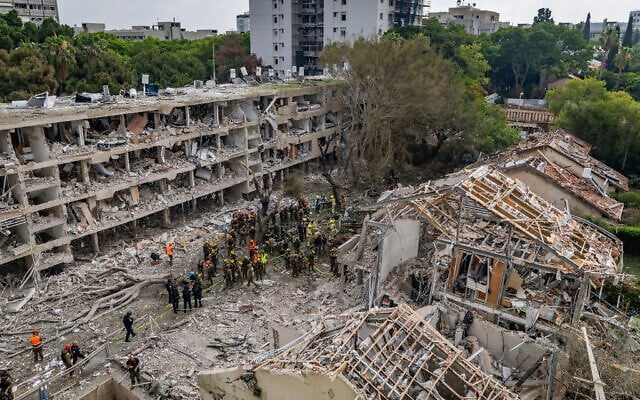
JERUSALEM, June 23, 2025 (BSS/AFP) - Israel struck Tehran and Iran fired
missiles on Monday, as the war between the longtime foes raged after the
United States sent bombers to attack the Islamic republic's nuclear sites.
Here are the latest developments:
- Iran Guards, Tehran prison -
Israel carried out "strikes of unprecedented force against regime targets and
agencies of government oppression in the heart of Tehran", Defence Minister
Israel Katz said as an AFP journalist heard loud blasts in the north of the
Iranian capital.
Katz said the targets included the notorious Evin prison in the city's north,
known to hold political prisoners and dissidents as well as foreign
detainees.
Iran's judiciary confirmed Evin was struck, reporting "damage" and stressing
the situation was "under control".
Israel also carried out a strike on Fordo, according to the military and
Iranian media, a day after US "bunker buster" bombs hit the underground
nuclear site south of Tehran.
In Israel, air raid sirens sent people to bomb shelters on Monday, with the
military reporting at least three missile barrages in less than two hours.
- Qatar suspends air traffic -
Qatar temporarily suspended air traffic around the country, its foreign
ministry said Monday, after Iran threatened retaliation for US strikes on its
nuclear sites.
"The competent authorities announce the temporary suspension of air traffic
in the country's airspace, as part of a set of precautionary measures taken
based on developments in the region," the foreign ministry said. Qatar is
home to the United States' largest base in the region.
- Iran warns United States -
Iran's armed forces chief of staff Abdolrahim Mousavi vowed on Monday that
the country would take "firm action" in response to US strikes on key nuclear
sites.
"This crime and desecration will not go unanswered," said Mousavi in a video
statement published on state TV, adding that "we will take firm action
against the American mistake".
Ali Akbar Velayati, an adviser to Iran's supreme leader Ayatollah Ali
Khamenei, said bases used by US forces "in the region or elsewhere" could be
attacked.
The US embassy in Bahrain -- home to a major US naval base -- reduced on-site
staffing citing "heightened regional tensions".
In Qatar, home to large a US airbase, the American embassy told its citizens
to "shelter in place until further notice".
Meanwhile, major international oil companies in Iraq, where the US has troops
deployed and Iran backs various armed groups, had evacuated foreign staff,
the state-owned Basra Oil Company said.
- 'Spillover' -
China on Monday warned against "the spillover of war", urging the
international community to do more to prevent the fighting from impacting the
world's economy, noting the global importance of the Gulf maritime trade
routes off the Iranian coast.
Oil prices briefly fell into the red on Monday after surging, as traders
weighed possible retaliation by Iran.
US Secretary of State Marco Rubio called on China to help deter Iran from
closing the Strait of Hormuz, a chokepoint for one-fifth of the world's oil
supply.
The European Union's foreign policy chief, Kaja Kallas, said closing the
strait would be "extremely dangerous".
Russian President Vladimir Putin slammed attacks on Iran as "unprovoked" and
"unjustified" in a Moscow meeting with Tehran's Foreign Minister Abbas
Araghchi.
German Chancellor Friedrich Merz said of the strikes, "There is no reason to
criticise what America did at the weekend. Yes, it is not without risk. But
leaving things as they were was not an option either."
NATO chief Mark Rutte, meanwhile, said alliance members had "long agreed that
Iran must not develop a nuclear weapon" and called an Iranian atomic bomb his
"greatest fear".
- Nuclear stockpiles -
The UN's International Atomic Energy Agency demanded Monday the return of
inspectors to Iran's nuclear sites in a bid to "account for" its highly
enriched uranium stockpiles.
"Allow IAEA inspectors... to go back to Iran's nuclear sites and account for
the stockpiles of uranium" including the "400 kilograms enriched to 60
percent", said agency chief Rafael Grossi.
At an emergency meeting of the organisation's headquarters in Vienna, he said
Tehran had sent him a letter on June 13 announcing the implementation of
"special measures to protect nuclear equipment and materials".